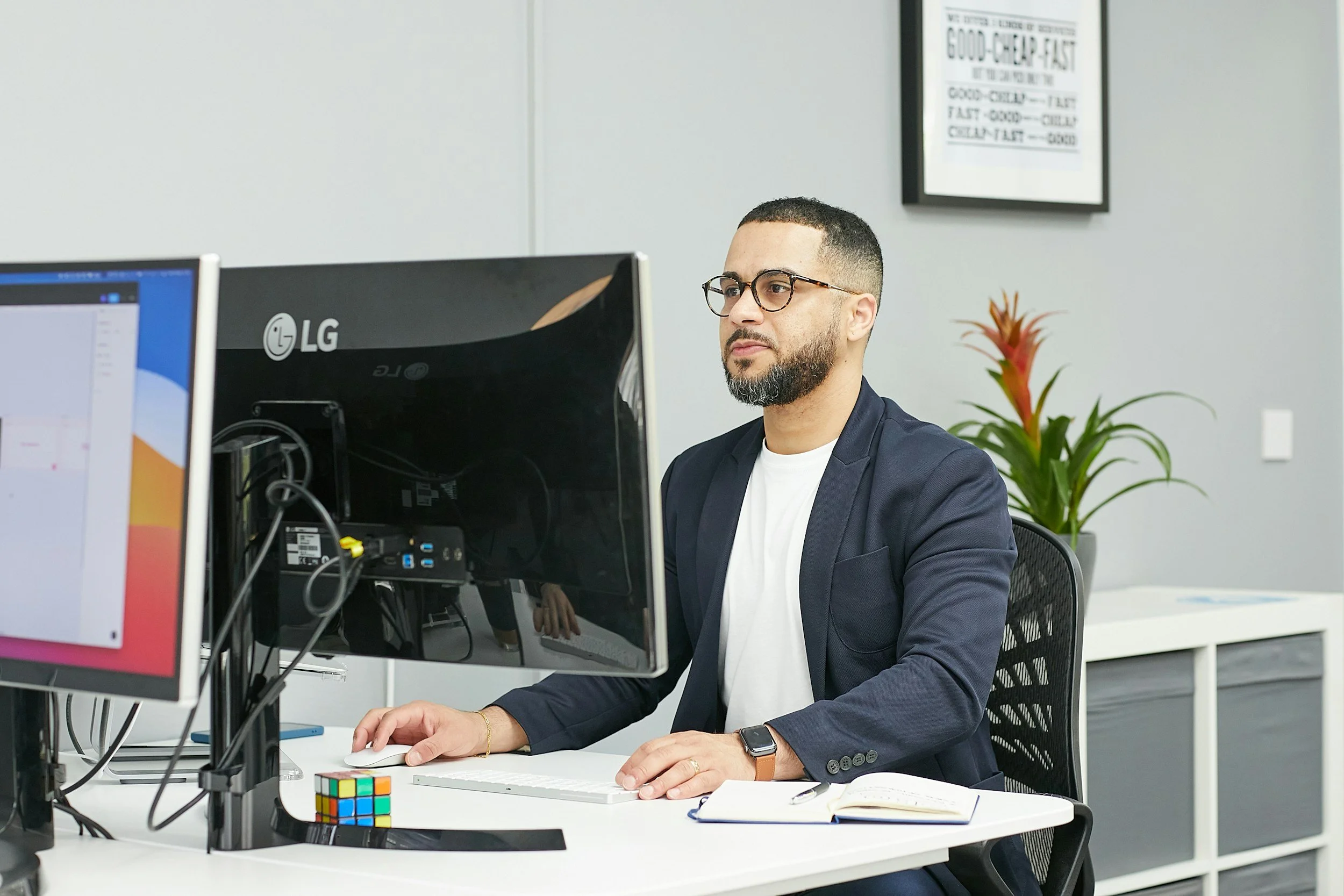Pre-Recorded Video Interviews: What They Are, Why Employers Use Them, and How to Ace Yours
Have you been asked to complete a pre-recorded video interview? This guide explains what to expect, why organisations use them, and the most effective pre-recorded video interview tips, with example questions and model answers.
What is a pre-recorded video interview?
A pre-recorded video interview (sometimes called a one-way or asynchronous interview) is an online interview where you record answers to set questions on a platform or app. There’s no live interviewer. Recruiters review your recording later and decide who progresses to the next stage.
How it works:
You receive a link from the recruiter or platform.
You’ll complete camera/mic checks and usually 1–2 practice questions.
You answer timed questions (often with limited retakes).
Your video is scored by trained reviewers and, in some cases, assisted by AI.
Pre-recorded video interview software commonly used in the UK includes HireVue, VidCruiter and Shine Interview. Some organisations also accept a short self-recorded video (e.g., via Zoom or phone) with instructions.
Why are pre-recorded interviews used?
Employers and agencies use them to:
Screen efficiently at scale (perm and temp hiring, all sectors and levels).
Standardise early assessment for fairness and consistency.
Check role-specific skills (e.g., technical knowledge, languages, customer communication).
Keep processes fast and flexible for both candidates and hiring teams.
Support hybrid recruitment—often video first, then live/panel/final stage in person.
Good to know: Many senior candidates now encounter pre-recorded steps—this is no longer just a graduate practice.
How to prepare (and stand out)
Pre-recorded video interview tips
Treat it like a live interview. Re-read the job description, map your evidence to the key competencies, and research the organisation.
Practise on camera. Record yourself (using Zoom/Teams) and watch back for clarity, pace, and impact.
Set up your space: quiet room, neutral background, eye-level camera, good lighting, phone on silent.
Know your structure. Use STAR (Situation, Task, Action, Result) for competency answers; finish with a short “so what/impact” line.
Look at the lens. It reads as confident eye contact.
Own the timing. Most questions are 60–120 seconds. Aim for 3–5 concise points, not a script.
Sound matters. Test mic levels; speak clearly; avoid rushing.
Mindset first. Calm/grounded breathing, posture tall, shoulder roll, smile.
Accessibility & adjustments. If you need extra time, captions or a different format, ask before you start—the onus is on the employer to consider reasonable adjustments.
Data & privacy. Read the consent notice to understand how long recordings are stored and who can access them.
Standard formats you might see
Openers: “Tell us about yourself,” “Why this role/company?”
Competency questions: “Give an example of when you influenced stakeholders,” “Tell me about a time you improved a process.”
Situational prompts: “What would you do if…?”
Technical checks: short task, demo, or brief explanation (e.g., product, policy, query handling).
Motivation/values: “What motivates you?” “Which of our values resonates most and why?”
Pre-recorded video interview questions and answers (examples)
Below are brief models you can adapt. Keep your language natural; aim for 90–120 seconds per response.
1) “Tell us about yourself.” (opener)
Frame: 10% past, 20% present, 70% relevant.
Example (outline):
Past: “I’m a project manager with 8 years in healthcare tech…”
Present: “…currently leading cross-functional delivery across 3 NHS Trusts…”
Relevant: “…this role needs stakeholder influence and service redesign; my last programme cut wait times by 18%—happy to share the approach.”
2) “Give an example of when you led change.” (competency – STAR)
S: Clinic backlogs after new EPR rollout.
T: Reduce appointment delays within 12 weeks.
A: Mapped bottlenecks, set daily huddles, retrained frontline on triage, built a Power BI tracker.
R: Reduced DNAs 12%, cleared backlog in 10 weeks, patient satisfaction +9pts.
So what: “This shows I deliver measurable change with data and engagement.”
3) “How would you handle conflicting priorities?” (situational)
Clarify outcomes/constraints → triage by impact/urgency → negotiate trade-offs → time-box and communicate risks → review.
Close with a short example that proves you’ve done it.
4) “Explain a complex topic to a non-specialist.” (communication)
Hook → plain-English analogy → one visual/metric → check-back → next step.
What to do on the day
Checklist: ID ready (if requested), battery/charger, stable Wi-Fi, notifications off.
Before each question: Skim the prompt, pause 2–3 seconds, then begin.
If you stumble: Brief reset (“Let me restate the core point…”)—keep going.
Closing: If given a final prompt, summarise your fit (3 bullets) and your motivation.
How to pass a pre-recorded video interview
Match evidence to the role. Mirror the language of the job ad/competency framework.
Be concise. Strong open, clear middle, memorable end (result/impact).
Show motivation. Why this team, product, service, or mission—be specific.
Professional presence. Camera/lens, pace, warmth, and confidence.
Follow instructions. Time limits, retake rules, and file formats (if self-recording).
Pre-recorded video interview examples (structure you can copy)
Two-minute competency answer (template):
0:00–0:15 – Context (what/where/why it mattered)
0:15–1:15 – What you did (3–4 actions; “I” not “we”)
1:15–1:45 – Outcomes (numbers, quality, feedback)
1:45–2:00 – Lesson/transfer (“This is relevant because…”)
Sixty-second motivation answer (template):
0:00–0:20 – What attracts you (mission/product/impact)
0:20–0:45 – Your relevant strengths/evidence
0:45–1:00 – What you’ll bring in the first 90 days
Pre-recorded video interview software (what to expect)
Platforms: HireVue, VidCruiter, Shine Interview (others exist).
Features: timed answers, practice mode, mobile apps, structured prompts, sometimes AI-assisted review.
Tip: If retakes are allowed, use them sparingly—your first confident take often feels most natural.
FAQs
Are pre-recorded interviews fair?
They can be—standardised questions and scoring. If you require adjustments (such as extra time, captions, alternative format), please request them in advance.
Will AI judge my video?
Some platforms assist reviewers. Most UK employers still include human oversight. If you’re concerned, request clarity on how your video is assessed.
What if my tech fails?
Take a screenshot, inform the recruiter immediately, and request to reschedule or switch to a phone/live video calll.
Ready to get interview-ready?
If you want tailored practice—with feedback on your answers, presence and structure—I offer Interview Coaching (including pre-recorded video mock interviews and competency frameworks) for professionals at all levels.
About Diana Dawson
Diana Dawson is an Accredited Master Coach with the Association for Coaching, a Coaching Psychologist, and founder of Working Career. With over 20 years’ experience helping professionals at all levels prepare for interviews and career transitions, Diana specialises in providing practical strategies and confidence-building techniques to help clients succeed.
She has supported thousands of clients—from graduates to senior executives—helping them navigate complex recruitment processes, including competency-based interviews, pre-recorded video interviews, assessment centres, panel interviews, and technical tasks.
Diana combines her background in psychology, career counselling, and occupational coaching with an up-to-date understanding of UK recruitment trends to ensure you walk into your next interview prepared, confident, and ready to impress.
If you’d like personalised coaching to improve your interview skills, prepare for pre-recorded video interviews, or practise your answers in a mock interview setting, get in touch today.

